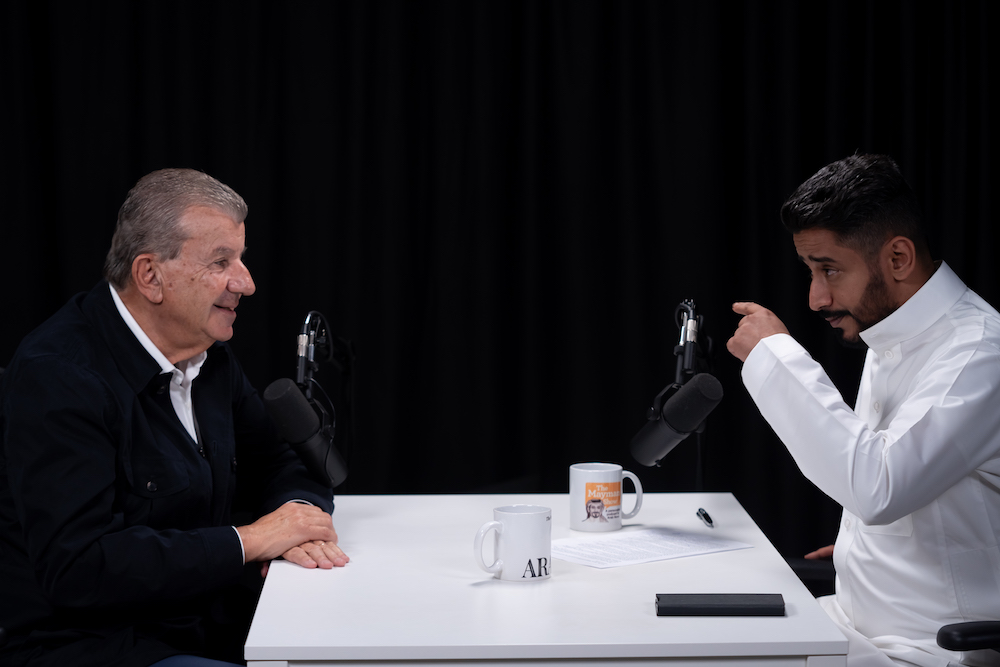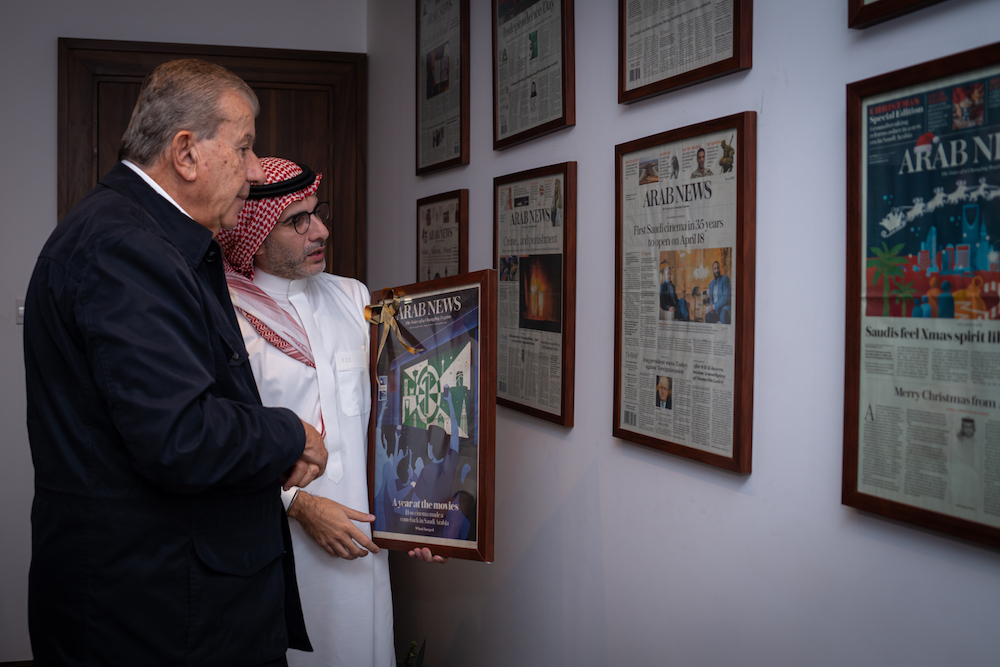RIYADH: For decades, Tunisian film producer Tarak Ben Ammar transported moviegoers into magical desert landscapes, from Tatooine in “Star Wars” to the shifting sands of “Raiders of the Lost Ark.”
Now, the veteran filmmaker has set his sights on what he says could be one of the film world’s next big locales: Saudi Arabia.
With a filmography stretching back to the early 1970s, Ben Ammar has been a part of blockbusters such as “Star Wars,” “Indiana Jones,” “Scream,” “Equalizer 3,” and “The Passion of the Christ.”
The dozens of films he worked on employed one million people, and established Tunisia as a player in the film industry.
Aside from film, Ben Ammar also managed Michael Jackson’s HIStory World Tour in the 1990s, has served as an adviser to Rupert Murdoch and Silvio Berlusconi, and is the head of Italy’s top independent film distribution and production company Eagle Pictures.
Ben Ammar said he saw the potential of Saudi Arabia as a film hub on noticing the success of his movies, particularly “Equalizer 3,” in the Kingdom.
“I did the research on the box office of that movie,” he told The Mayman Show, the Arab News podcast that features personal conversations between my host and my guests.
“You had England, UK, Germany, France, Australia, and then Saudi Arabia. So outside of the US, Saudi Arabia is becoming the place to be for my industry.
“That’s why ... I will be involved. To attract, of course, foreign films to come into Saudi Arabia but also to develop local Saudi culture, to develop local Saudi talent.”

Tarak Ben Ammar told The Mayman Show host Hussam Al-Mayman how lessons learned through his work on some of the biggest films in cinematic history could be applied to Saudi Arabia. (AN Photo)
More specifically, Ben Ammar said: “If a ‘Star Wars’ comes here, we will help you with tax credits. You have to employ locals.
“I employed a million people in my country by imposing in every department a technician. So, when they leave, they leave behind their knowhow so that those young people will know what a big film is.”
Speaking of Saudi Arabia, he said the country “has 38 million people; it has its own market. It has a youth that is hungry to be entertained, to create. Because, you know, there was a moment when if you were a young 18-year-old girl or boy and you want to be a painter, a musician, a writer, a singer, a director, or an actor, what did you do? You had to go to London, to Paris, to America.”
He added: “You are blessed by having a young population. And that’s why I said to myself — wait, this is a great market. I have to come here and invest.
“Usually, people come to Saudi Arabia to take your money. I am coming to invest in your country. Invest my knowhow, my knowledge, my name, my credentials, and bringing with me people who say, ‘This is what we’re going to be doing.’ We’re going to build the emerging industry of Saudi Arabia.”
Though potential tax incentives and rebates for filmmakers are certainly a reason for its allure, Ben Ammar says his plans for the Saudi film industry may be different to what he has done in Tunisia or elsewhere.
“The rebates are not enough,” he said on the Arab News podcast The Mayman Show. “First and foremost, I am not obsessed with bringing Hollywood to Saudi Arabia. That’s a very small part.
He pointed out that in Saudi Arabia, and indeed the entire Middle East region, American and Egyptian movies dominate the market.
“Today, you have, let’s say, 50-50, American and Egyptian movies. If we can lower that and make it 40 percent American, 40 percent Egyptian and 20 percent Saudi, then you have new filmmakers, new actors, new musicians, new directors, new writers, that then will sell Saudi Arabia more than just to come here and make movies.”

Tarak Ben Ammar during a tour of the Arab News HQ in Riyadh. (AN Photo)
A burgeoning Saudi film industry may also address the issue of Arab representation in Hollywood, he said, explaining that at a certain point in film history, Arabs became classic villain archetypes.
“It was always the Arabs with the Palestinian keffiyeh. Well, of course, because of the Six-Day War, the ’73 War, and Hollywood being very pro-Israel — it still is — so the terrorist was an Arab,” he said.
“We are the ones that need to help films get made where the story is different. The narrative of my cousins, my Arab cousins and brothers, in stories should be different. But it’s happening. We’re seeing different stories about Arabs. I have made a few movies of that myself. So, I’m optimistic that we’re not in the category still of the bad guys, I think.
“And if we become partners in this market — you want to come to our market, you treat us well.”
Ben Ammar said that the creation of more foreign-language news channels, such as many other countries have done with Russia Today, BBC, CNN and Al Jazeera, will also help bolster the Kingdom’s international image.
“The Kingdom just won Expo and the World Cup,” he said, referring to the 2030 World Expo and the men’s football 2034 World Cup.
“Of course, you would want television to reflect why you won the Expo, why you won the World Cup. There’s people here that know what they’re doing and are selling the Kingdom and its culture and its evolution.”
Ben Ammar’s dream as a young, up-and-coming filmmaker has a personal and emotional connection to the Kingdom through his uncle, the first president of Tunisia, Habib Bourguiba.
“And Tunisia owed a lot to Saudi Arabia, because when he was in exile and fighting the French for independence, the Kingdom’s founder Ibn Saud (King Abdulaziz) helped us; helped him. The Saudi culture was very much in my heart,” he said.
He said one of the first films he wanted to make was about King Abdulaziz.
“It was the early 1970s, and Saudi Arabia certainly was not the Saudi Arabia I had discovered, but the shock was starting in 2016 when I saw what it was becoming. I was privileged to have met the crown prince and to see the vision,” he said.

The dozens of films Tarak Ben Ammar worked on employed one million people, and established Tunisia as a player in the film industry. (AN Photo)
Ben Ammar’s determination to help further develop culture in the Middle East was sparked by an event in 2009, when he traveled to the Abu Dhabi Film Conference to be its keynote speaker.
“As I was landing, I read an article that disturbed me greatly. It said: ‘The Middle East will be acquiring hundreds of billions of dollars of armaments in the next 20 years.’”
He went on to give a speech, saying: “A nation without a culture is nothing more than a supermarket of consumers. A nation without a past really has no future.”
In 2018, Ben Ammar said, he was approached by Saudi Minister of Culture Prince Badr bin Abdullah bin Farhan, who asked him to lend his expertise to the strengthening of the Saudi film industry.
“In coming here, I saw the evolution of the multiplexes, the films, and last month I was here for a conference on the film commission,” he said.
Ben Ammar also spoke about his experience in bringing feature films such as “Star Wars” and “Indiana Jones” to his home country, and how that experience could be applied to Saudi Arabia.
“When I started my career in Tunisia, we didn’t have a market,” he said.
“You, here, have an advantage, if I may compare, the Saudi model should be exactly what South Korea did. Look at South Korea. They created their own business, their own music, their own directors, their own TV series. And then they started exporting because they trained their people.”
The Korean film industry has been increasingly successful in recent years, with series such as “Squid Game” becoming international smash hits. In 2019, the Korean film “Parasite” made history by being the first non-English language film to win an Oscar for Best Picture.
“It wasn’t made to be exported. It was a Korean movie, a beautiful one that conquered the world,” Ben Ammar said.
“Maybe in my lifetime I will see a Saudi movie do the same, to make us Arabs proud as the Koreans were proud of ‘Parasite.’”



































